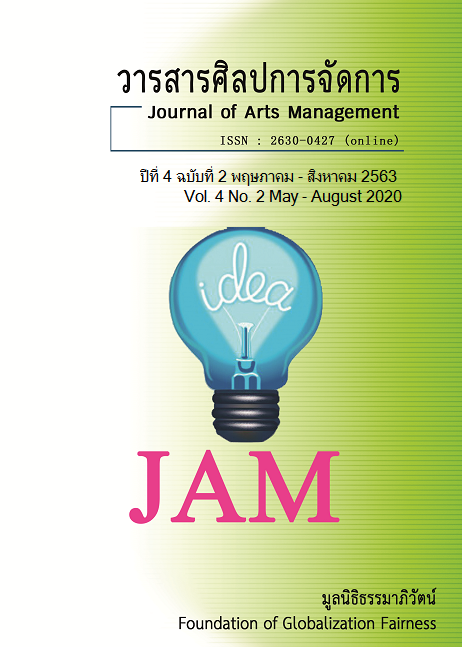An Effect of Teacher Spirit Strengthening Program Based on Buddhist Psychology for Student Teachers
Main Article Content
Abstract
Objectives of the study included 1) to study teacher spirit strengthening concepts and Buddhist Psychology principles; and 3) to propose an effect of the Teacher Spirit Strengthening Program based on Buddhist Psychology for student teachers. It was a mixed method using a qualitative research to expand a quantitative research. A sample of the study included 60 first year student teachers divided into two groups of experiment and control with 30 students each. Tools of data collection comprised a measurement of teacher spirit, observation, personal record and Teacher Spirit Strengthening Program based on Buddhist Psychology for student teachers by designing experiments into two periods: the first period of three days and second period of 1 month. For analyzing quantitative data statistics including t-test and two – way repeated measures ANOVA was employed, and a content analysis was used for analyzing qualitative data.
Results of the study were as follows:
- Teacher spirit strengthening concepts and Buddhist Psychology principles included the teacher spirit strengthening process based on 4 virtues for lay people and 4 principles of service, and 2 aspects of measurement including belief and behavior. Moreover, 7 qualities of a good friend and 4 sublime states of mind were designed as the attributes indicating the teacher spirit of student teachers.
- An effect of the Teacher Spirit Strengthening Program based on Buddhist Psychology for student teachers comprised 12 units, namely, 1) being aware of the truth, 2) understanding the principles of development, 3) always being happy with others, 4) understanding the truth of life, 5) having leadership, 6) understanding and accessing work on duty, 7) being indifferent to matters that should be ignored, 8) being aware of the consequences of their actions towards the public, 9) always sympathizing with others, 10) knowing how actions affect others, 11) having patience, and 12) being responsible for duty. These indicated that the point of student teachers of the experimental group was higher than before an experiment and higher than that of a control group at the statistical significance of .05, and the result of qualitative data analysis also supported the quantitative data showing that the participants took ways of thinking and practice for self-development based Buddhist Psychology for strengthening their potential in working and daily life.
Article Details
Views and opinions appearing in articles in the Journal of Arts of Management It is the responsibility of the author of the article. and does not constitute the view and responsibility of the editorial team I agree that the article is copyright of the Arts and Management Journal.
References
นิติพล ภูมิตะโชติ. (2556). พฤติกรรมองค์การ. กรุงเทพฯ: สำนักพิมพ์แห่งจุฬาลงกรณ์มหาวิทยาลัย.
ปฎาวุฒิ สุจินดามณีชัย. (2556). การยอมรับตนเองและบุคลิกภาพห้าองค์ประกอบที่พยากรณ์ความฉลาดทางจิตวิญญาณของครู โรงเรียนสังกัดสำนักงานเขตพื้นที่การศึกษามัธยมศึกษา เขต 10 จังหวัดสมุทรสาคร. (วิทยานิพนธ์). บัณฑิตวิทยาลัย มหาวิทยาลัยเทคโนโลยีพระจอมเกล้าพระนครเหนือ.
ประกาศกระทรวงศึกษาธิการ. พระราชบัญญัติการศึกษาแห่งชาติ พ.ศ. 2542 (ฉบับที่แก้ไข2545). ประกาศใช้ 7 สิงหาคม 2549.
พระเทพเวที (ประยุทธ์ ปยุตโต). (2532). พจนานุกรมพุทธศาสตร์ ฉบับประมวลธรรม. (พิมพ์ครั้งที่ 5). กรุงเทพฯ: มหาจุฬาลงกรณ์ราชวิทยาลัย.
พระธรรมปิฎก (ป. อ. ปยุตโต). (2542). วิธีคิดตามหลักพุทธธรรม. (พิมพ์ครั้งที่ 5). กรุงเทพฯ: สำนักพิมพ์ศยาม.
พุทธทาสภิกขุ. (2529). ฟ้าสางระหว่าง50 ปี ที่สวนโมกข์. กรุงเทพฯ: การพิมพ์พระนคร.
พุทธทาสภิกขุ. (2553). การศึกษาความสมบูรณ์แบบ: คือวงกลมที่คุ้มครองโลกถึงที่สุด. กรุงเทพฯ: ธรรมสภา.
ภาวัต ตั้งเพชรเดโช. (2556). จิตวิญญาณความเป็นครูกับความก้าวหน้าในอาชีพที่พยากรณ์ความทุ่มเทในการทำงานของครู. (วิทยานิพนธ์). บัณฑิตวิทยาลัย มหาวิทยาลัยเทคโนโลยีพระจอมเกล้าพระนครเหนือ.
มหาวิทยาลัยมหาจุฬาลงกรณราชวิทยาลัย. (2539). พระไตรปิฎกภาษาไทย ฉบับมหาจุฬาลงกรณราชวิทยาลัย. กรุงเทพฯ: โรงพิมพ์มหาจุฬาลงกรณราชวิทยาลัย.
ยนต์ ชุ่มจิต. (2542). การศึกษาและความเป็นครูไทย. กรุงเทพฯ: โอเดียนสโตร์.
สันทา วิจิตรเนาวรัตน์. (2559). ต้นทุนทางจิตวิญญาณของความฉลาดทางจิตวิทยา. นนทบุรี: สำนักพิมพ์สัมปชัญญะ.
สาโรช บัวศรี. (2549). การศึกษาและจริยธรรม. กรุงเทพฯ: มหาวิทยาลัยศรีนครินทรวิโรฒ.
อรรถวิช จารึกจารีต และประณต ฉีมเค้า. (2557). จิตวิทยาการเรียนรู้. กรุงเทพฯ: มหาวิทยาลัยเกษมบัณฑิต.


